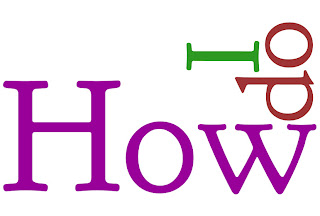
So, what about Negative Comments? How Do I deal with them?
A question that comes up frequently during social media discussions is "what about negative comments?"Not a big surprise when the perception is that, by allowing comments, feedback, ratings & interaction, you open the floodgates and will be sure to drown in negative feedback...
Now, although negative comments happen, they happen less frequently than you think. And, when they do, they aren't necessarily all bad.
You see, your willingness to consider different perspectives makes your social presence and content much more believable. Furthermore, showing acceptance of different opinions communicates that you are open to constructive exchanges.
Consider these two perspectives on negative comments:
The Positive Side of Negative Product Reviews reports that "...web sites with negative reviews have higher conversions than web sites without them." Furthermore, negative feedback can help guide product development and "using those negative reviews shows your customers your listening, and it helps you to create better consumer products and better marketing messages."
8 reasons why negative comments are good for your blog lists the following:
+ You can be wrong. + Criticized posts are... popular posts. + Negative comments on your blog show that you respect your readers and their thoughts. + Negative comments can create a debate. + Negative comments don't devalue your blog. + Negative comments are... content. + Only the unknown aren't criticized.
[My most negative comment "Sorry Pumpkin" turned into a very popular post about LabCorp and Customer Service.]
During a recent presentation [see Urban Outfitters: Be Where Your Customers Are], Urban Outfitters made the point that people are already talking about you. Wouldn't you rather hear what they are saying and have a chance to participate in that conversation? You might actually learn from the experience and improve your business or offering. After all, those conversations are the equivalent of research sessions with your most passionate customers...
At the heart of social media is a willingness to enter into conversation and exchange perspectives with customers, readers, fans and followers [see Three Years of Social Media - Lessons Learned.] Done with respect, there's more to gain than lose.
That said, it's critically important to set guidelines and establish policies so you are ready to respond and able to do so consistently and respectfully. [See How Do I Start With Social Media Guidelines?] Policies help you determine what customers can expect from you in your responses and what you expect from customers in how they provide you with feedback.
Urban Outfitters reminded us that their social channels are no different from their other customer channels. They have processes in place to deal with complaints and returns regardless of the venue. They are also committed to listening, acknowledging and interacting with the customers, fans, followers and readers who form their community.
Nonetheless, there have been plenty of ugly stories in the news about negative comments. Many are downright scary and highlight how quickly conversation tone can change, something CoPilot Live's Devon Valenti discovered. Several recent fiascos inspired these next few articles which include lessons and suggestions to take into consideration as you become immersed in digital social interaction
5 Lessons from Social Media PR Disasters suggests:
1. Not getting defensive [as Nestle did].
2. Closely watching social networks for complaints as Southwest did in February 2010 when Kevin Smith tweeted his complaints.
3. Using common sense when interacting with your customers [e.g, Toyota Matrix's 'Your Other You' with prank stalking].
4. 'Be vigilant of how how employees use social media' inspired by the 2009 Domino YouTube.
5. Being sure not to insult a cohesive community [e.g., Motrin Moms]
In CRISIS PLANNING: Prepare Your Company For Social Media Attacks Jeremiah Owyang discusses more extreme organized social attacks and how to be prepared. He mentions needing to have a community strategy, delegating interaction with the community to a seasoned professional - rather than a newbie or intern - to closely monitor and interact with members.
If you remember in HIMSS, Social Media & Healthcare IT Community, HIMSS actively manages its LinkedIn, Facebook and Twitter communities.
I like this article on Seven Ways Hospitals Can Address Facebook Criticism by Jenn Riggle. In addition to having a social media policy, Jenn recommends transparency, a disclaimer policy, monitoring the conversations, being quick and concise, deleting inappropriate comments [to that I add, as it relates to blogs, be sure to moderate comments especially given how spam has grown], turn negative comments into "teaching moments", but at the same time be ready to take a conversation offline for resolution.
Defeating the Dark Side of Social Networking emphasizes how important it is to pay attention to what's being said online and to respond quickly.
AdAge in Can One Bad Tweet Taint Your Brand Forever? [registration required] urges not necessarily responding to every criticism. Better to consider the following factors before taking action:
- How credible is the source?
- How influential is the forum?
- How common is the complaint likely to be?
- How serious is the complaint?
- How likely is my response to make things worse?
- How important is my issue to my brand's consumers?
Tap the Power of Customer Feedback by Carolyn Hall reminds us how much business value we can gain from customer insights. What better way is there than through social media tools to connect with potential and actual customers and obtain feedback on products and services - even if the feedback is negative!
Better, then, to have a presence on social sites rather than ignore them so you can explore, experiment, listen, engage and be ready. Better to build you customer community gradually and consistently over time so you truly develop meaningful relationships with members. And, then, if you do launch a social campaign that isn't quite as successful as you hoped or that gets out of control, your community can help keep your message relevant.
Do you agree? How do you deal with negative comments? Do you have a policy in place? How have you integrated your off and online presence so both are consistent?
Image credit: Wordle How Do I" by C.B. Whittemore








No comments:
Post a Comment
Reminder: Please, no self-promotional or SPAM comments. Don't bother if you're simply trying to build inauthentic link juice. Finally, don't be anonymous: it's too hard to have a conversation. Thanks, CB